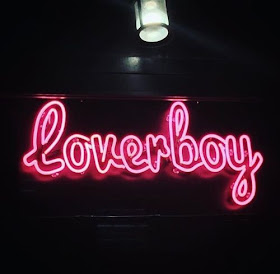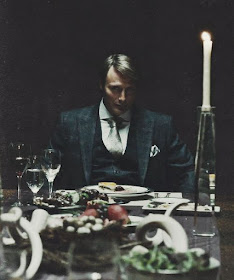Today marks the start of Loverboy week in the Dartmoor Read-Along - you can grab if HERE for 99c - and though most of you have already read it once before, and know what it entails, I think it's only fair to remind everyone that, given the book's dark themes, the discussion from here on out is going to cover some difficult subject matter. I want to start with one last look back at Secondhand Smoke, because the events of that book are what set Tango down the dark path he travels during his own book.
Here goes.
What happens to Tango in Smoke is no one's fault except Don Ellison's. He's the villain here; he's the one who kidnaps him, imprisons him, and lets his thugs torture him. Aidan feels terribly guilty - because his own drama prevented him from being as tuned-in to Tango's spiraling depressive state before the kidnapping happens - but Aidan's certainly not to blame for what happens.
The thing about Tango is: that depressive spiral has been slowly happening throughout the course of the series. There's a sadness to him in Fearless, even though the source isn't revealed. Price of Angels is where things really start to go downhill; he's lived for years with a band-aid slapped over his trauma, but seeing Ian again, so unexpectedly, and seeing Ian as this villain who's causing trouble for the club, shatters the fragile peace he's constructed for himself. Tango is not just a club nickname, but a new identity; a shield to hide behind. Most of his club brothers know him as Tango, but here's Ian, who knows every intimate detail of his life as Kev. Who endured all the same trauma and hardship alongside him - and who he left behind. That moment in the funeral home in PoA is the start of everything going sideways for Tango. He begins a slow retreat into a dark headspace, and, through SS, his coping drug of choice is sex. It's all tangled for him; his sense of self-worth, indeed his whole sense of self, is tied up in sex, and so when he feels vulnerable and uncertain, thats' his got-to. That's a part of his identity he's certain of, and so it's become a crutch.
At the beginning of Smoke, though, we see that it's a joyless vice for him, at this point. He's getting an immediate thrill and gratification, sure, but he's feeling hollow and aimless and pretty bleak. Jasmine has been a source of comfort for him for a long time now; she likes to have a good time, and doesn't feel ashamed of it. In their time together, that attitude has helped him to let go of some of his own shame surrounding sex. But things have shifted, now, and he feels disconnected from her - evident in the way he takes a big step back and lets Carter take his place. He's drowning, and there's only one person who can remind him of who he really is; the person who loved him at his absolute worst. He goes to Ian.
At this point, Ghost is the only one who knows Tango is spending time with Ian outside of necessary club business. And Ghost is worried; at the beginning of the book, Ian's just asked to be "given" Kev, a favor Ghost refused outright, and with good reason. He doesn't know all the details of their relationship, but he knows Ian has a vicious streak, and a careless streak, and he can see the danger signs flashing for Tango. One could argue that Ghost should have taken a more active role, here; told Tango to keep away from Ian, inserted himself more firmly into the situation. After all, look what he did to break up Mercy and Ava.
But this is a very different situation. For starters, Tango isn't his biological child - not that he loves him any less for it, but he doesn't feel like he has the "right," so to speak, to be dictatorial. The other aspect is, Tango's personal history of abuse and addiction give Ghost pause; he doesn't ever want to say or do anything to put Tango back into his darkest of places. He can see that something is badly wrong, but, given Ghost has the emotional intelligence of an old tree stump, he doesn't really know how to go about helping without causing further harm. And I think there's a part of him, deep down, that thinks Ian might - just might - have a point. Ghost knows that, despite all the love, support, and relative stability of the club, Tango isn't happy, that he doesn't feel safe - evidenced by the way Tango acts nearly frightened of Ghost when he hands over the map. They've tried it this way; what if Ian's life of luxury and insulation, of imported cars and bodyguards, is a better approach? Ghost doesn't know.
And then Tango is abducted.
Here's another moment for the audience to hate Ghost! Rest assured I hate him here, too. I remember being actively angry when I wrote the scene where he turns down Ian's offer. But, once again, I see it as my job to adhere to the characters as they are; to write them consistently. The thing about Ghost is that, except when it comes to Maggie and their kids, he doesn't ever operate while wearing just one hat - though we see a shift in that with Loverboy. I think Loverboy is the book where Ghost finally takes a long, hard look at himself. Up to that point, he's always looking at every situation from a variety of angles. It would have been a really feel-good moment for him to jump on Ian's offer and set everything else aside in the effort to rescue Tango. But that's not how Ghost operates. He still doesn't trust Ian, and he's certainly not going to essentially sell his club to the man without thinking things through. Ian would have them at an incredible disadvantage, and he isn't ready to concede to that.
His hesitation, though, provides a chance for Aidan to act on purely emotional impulse - and for the better, this time. I've seen readers say Aidan was "dumb" for staging a rescue attempt without Mercy leading the charge, but Mercy, loveable and lethal as he is, is a wrecking ball of a human being. Instead, Aidan turns to the precise, knifelike skills of Fox. And, in a lot of ways, Fox is the smart choice, because he doesn't get emotionally involved in things. If Fox agrees to the scheme, and comes up with it, even, then Aidan feels like at least someone is thinking this through, as opposed to merely reacting.
This situation with Tango is really the most complex of the whole series. There's lots to unpack. And the thing is, I think there could have been a version of the story in which Tango stayed with Ian, and you can't know how tempted I sometimes am to write an AU of my own story - but it would have gotten much darker before it got lighter, because they're both so damaged, and it would have taken a long time for them to learn how to lift one another up, rather than drag one another down.
We'll talk about it, and so many other things, this week as we crack open Loverboy and tackle Tango's demons. Terrible things happened in that basement in Secondhand Smoke, but Tango also met Whitney there, and she's a vital part of his recovery.


















